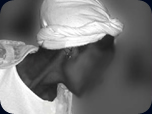By Omo Ase
Before my year, I learned much about the rules of the year (wear white, eat and drink with your prescribed dishes and utensil, etc.) and about what I was NOT supposed to do (be involved in social activities, eat in restaurants, etc.). But I don’t feel as though I really understood what I was supposed to be doing. I mean, not socializing means spending a lot of time with self – which is fine for me – but to replace social time with becoming a couch potato or sleeping all day? What would be the purpose of that? Surely that can’t really improve one’s life and help one grow in understanding of the orisas.
As I creep towards the end of this year-long journey I have realized that I believe this year should really be about:
1. Focusing on connecting with the energies of the orisas. This seems like it should be obvious but I am not sure how explicitly this is taught. When I first brought my orisas home, I just stared at them for the first few days because I couldn’t believe they were in my house! After a while, I kind of avoided them because I wasn’t really sure how to handle this new energy and responsibility. After a while, though, I felt like I should talk to them, sit with them…do something. I have made it my daily morning routine to (after praying to Ori) meditate with and talk to my orisas. I now feel a connection between me and my orisas, and not just in my orisa room, but also in nature; I can feel Oya in the wind and Shango in the summer storms. I can feel Oshun at the river…and I really need to get to the beach to sit with Yemoja! I know the connection between myself and the orisas has definitely been made and I pray it gets stronger but I think sometimes elders in this tradition sometimes forget that newer people may need to be guided more explicitly in the process of connecting to the orisas.
2. Focus on growing with ancestral energy. When I first became an iyawo, I had an ancestral altar because I had to have one, but I had no idea how to do anything with that space. Praying to ancestors and working with ancestral energy was so far away from anything I had been taught before that I just felt completely out of my element. My connection to my ancestors has grown exponentially this year. I am now very aware when they are communicating with me. The focus of this year should be the orisas but because ancestors are our first line of spiritual connection, they cannot be neglected.
3. Focus on learning the religious philosophy, language, prayers, songs, and rituals. This is the part that needs the most explicit guidance, particularly when it comes to learning rituals. This is where a lot of the energy that we normally utilize for social activities should be expended. Instead of hanging out with friends, talking on the phone, or watching TV, the iyawo should be learning those things necessary to be an effective olorisa.
4. Create a life of discipline, uprightness, accountability, and balance. Being an iyawo can be terribly isolating (though not so for me, which makes me think maybe I am not doing something right, laugh). I was just talking to a priestess the other day that said her iyawo year was depressing because she felt so completely isolated. When I think about the purpose of the iyawo year it seems it should be to prepare the iyawo to be a well-balanced, responsible, ethical, and knowledgeable olorisa that can be of service to the community. Sometimes it seems that we get caught up in the rules and forget that they are just a means to an end. So, as an iyawo, one should not spend tons of time socializing, but does that mean you should not, for an entire year, spend time with supportive family members and friends? Some may say “yes” but then I ask: how will this isolation help you to be a better person and sound olorisa? Sometimes there is such an over-emphasis on the rules (“Oh my goodness, what if I touch someone while riding the subway?!”) instead of looking within to see how one can become more of an image of one’s higher self.
Again, these are just my reflections as a lowly iyawo who is just trying to make sense of some things and maybe it is not even my place to even express these opinions, at least not right now. But then I wonder how many iyawos feel the same way and perhaps, through voicing our opinions, we can help create a supportive structure for new initiates that can alleviate some of the discomfort that comes whenever we have a great transition in our lives.




